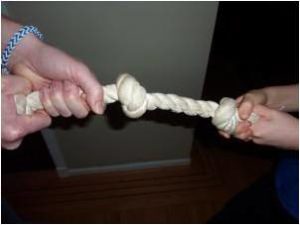This week I listened to an interview with Daniel Pink, author of the excellent and highly recommended book, Drive. Dan Pink is an expert on motivation. He has a lot of compelling evidence to show that rewards and threats, only work in the short-term and do not encourage kids and teens to become self-directed. He says that kids who are controlled either…
Comply or Defy
Do we want our kids to be purely compliant? Do we want our kids to be purely defiant?
No and No
It is human nature to want to be self-directed and autonomous, as every two year old reminds us! ~ Daniel Pink
We have may have forgotten how much we disliked being controlled and how much we still don’t like to be controlled! It is natural instinct to PUSH BACK when we feel PUSHED.
Dan Pink says: “Controlled kids may comply at first but then they defy”.
Yes, kids need limits and boundaries but they also need to be given choices within the parameters. They need to be part of decision-making and they need to be shown trust. He states that we need to get away from our default – to control.
How to Parent without Controlling Kids?
Let’s use a common example, that Dan chose, of a teen’s messy bedroom. Imagine a boy, Tom, who has hockey gear, empty pizza boxes and so many clothes on the floor that he can’t find anything!
His parents could choose to threaten, bribe or… support him in taking responsibility for his own room.
I’m sure we would all prefer to have our children take responsibility for their own room, but how does one actually put this into practice?
Dan suggests saying to Tom…
Parent: “On a scale from 1-10, with 1 meaning not being ready at all, and 10 being ready to clean your room, how ready are you?”
(If your child’s room is this messy, Dan says to expect a really low number)
Tom: “I’m a 2”
Parent: “Okay, you’re a 2, why didn’t you pick a lower number? Why aren’t you a 1?” (By asking this, it catches them by surprise)
Tom: “It’s annoying when I can’t find my stuff” (Note: Tom is articulating his own reasons. As Dan points out, motivation is not something that is done to Tom, the parent is helping Tom bring his reasons to the surface of his awareness.)
If Tom had said he’s a 1, then the parent would ask what can be done to help you reach a 2 – this helps to figure out barriers and identify ways to support him. Perhaps he’s so overwhelmed by the state of his room, that he needs help, getting it back in order.
This is a much more collaborative approach, than just getting angry and punishing/threatening.
One may have to brainstorm (together) some possible solutions. Perhaps the bedroom is in need of de-cluttering and too-small clothes plus out-of-style clothes need to be donated. This would create more space which would make it easier to put away one’s clothes. Maybe the bedroom is in need of a new coat of paint or rearrangement of furniture to give it a new, fresh look. Maybe more storage space needs to be available?
If collaboration doesn’t seem to be working, then the next step is logical or natural consequences.
Natural consequences would mean leaving the room “as is” and seeing if the empty pizza boxes eventually made their way to recycling. Hockey gear would not get washed whilst lying on the bedroom floor and this would pose a problem for the next upcoming practice/game.
Logical consequences would mean using the phrase “With freedom, comes responsibility” (A. Schafer) and since keeping one’s bedroom in a sanitary state is a responsibility, then freedom would be lessened if the room was causing discomfort to the whole family. In this case, “When your room is clean, then you can invite friends over”, “When your room is clean, then you can go out with your friends”, which fits with the “work then play” philosophy which they’ve hopefully heard from you at some point. Daniel Pink, warns against using statements such as “if“…”then” because “if” sounds more externally controlling. However, he also warns against using “When…then…” too often as well, because then it also begins to sound like a contingency.
Every family and every situation is different, but hopefully this has given you a few ideas to work with.
As famous parenting educator, Barbara Coloroso says:
Children cannot develop a sense of inner discipline, if all of the control comes from the outside.
For many teens who feel very externally controlled, they often use their bedroom as their place to have control. (They may also turn to more destructive self-harm methods such as alcohol/drug abuse, eating disorders, etc.) If they feel it is a power struggle then this gives them the power they are looking for, whereas if you can act nonchalant and “drop the rope”, it loses its power and then having a messy room becomes more of an annoyance than leverage for power against parents.
If you’re interested in following more of Dan’s work, you can find him on Ted Talks.
You may also be interested in my previous post on motivation: Intrinsic Motivation vs. Extrinsic Motivation and “Quality Worlds”.
I hope you have a wonderful week, thinking about coaching vs. controlling,
Warmly,
PS. Did You Know That 96% of Kids Lie? To Receive: My Free Report On Why Kids Lie and What To Do About It, click here.
PPS. If you enjoyed this article and would like to share it with friends and family, please use the social sharing buttons and/or email it to them. Thank you!
Want to Connect?
Subscribe now to receive free weekly parenting tips and inspiration.









